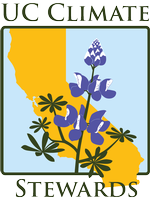 The UC Climate Stewards course is offered in various locations around California. It's predominantly online with on-site field trips. It focuses on climate change literacy and community engagement. The information on this page is related to Climate Stewardship, a new Initiative from the University of California Cooperative Extension in partnership with the Stewards of the Coast and Redwoods. PROGRAM GOALS:
What extreme events get your attention?For many in Santa Cruz County, it was the August 2020 CZU Lightning Complex fire. Dry lightning, a couple of days before the fire was detected, was a phenomena we rarely see on the Monterey Bay. In various parts of the State there were thunderstorm events that produced close to 11,000 bolts of lightning and started hundreds of fires. Dry lightning events have increased in areas experiencing mega-droughts. A mega-drought is a prolonged drought lasting two decades or longer. Other events caught my attention as well:
|
Archives |